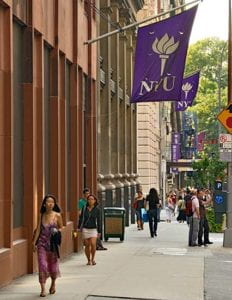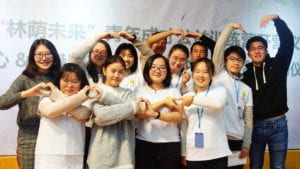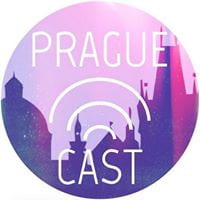 The latest PragueCast from NYU Prague is now live and available for a listen here. Launched in 2015 by Prague’s BBC correspondent, Rob Cameron, PragueCast is a podcast with stories of Prague told through the eyes of NYU Prague students. The 20-minute editions, each with a different theme chosen by students, are distributed to an audience beyond NYU Prague. Students write, record, produce, edit, and market the episodes – all as non-credit extracurricular program that meets in the evenings. We hope you’ll enjoy this latest offering!
The latest PragueCast from NYU Prague is now live and available for a listen here. Launched in 2015 by Prague’s BBC correspondent, Rob Cameron, PragueCast is a podcast with stories of Prague told through the eyes of NYU Prague students. The 20-minute editions, each with a different theme chosen by students, are distributed to an audience beyond NYU Prague. Students write, record, produce, edit, and market the episodes – all as non-credit extracurricular program that meets in the evenings. We hope you’ll enjoy this latest offering!
Global Dimensions
News and notes from across NYU's Campuses and Sites
Tisch Student Cat Heinen on Her Time at NYU Berlin
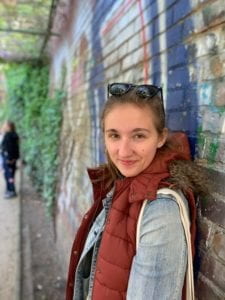 Tisch Special Programs offers study abroad opportunities in eleven locations around the globe during the academic year, January Term, and in the summer. We recently caught up with two students who studied abroad with us last spring.
Tisch Special Programs offers study abroad opportunities in eleven locations around the globe during the academic year, January Term, and in the summer. We recently caught up with two students who studied abroad with us last spring.
Cat Heinen, a Drama major, spent her semester training in Berlin through the Stanislavski, Brecht, and Beyond program. A rising senior, Cat describes her experience in Berlin and how it’s motivated her to explore other acting studios and disciplines and imagine her future beyond graduation (and New York City).
Why did you want to study abroad?
I came to NYU because of the tremendous study abroad opportunities. I knew I wanted to go somewhere I knew nothing about, a place I could discover as my own.
Why did you pick your particular program?
Stanislavski, Brecht, and Beyond is one of the two semester-long acting abroad programs, and it’s much newer than RADA [Shakespeare in Performance at the Royal Academy of Dramatic Art in London]. It’s close in style to what the Experimental Theatre Wing might offer, and that’s very different from the training I received at both Meisner and Stonestreet.
How did the location enhance the work you were doing there?
Everything we talked about in the classroom was present in the national, professional theatres. We were studying how the Third Reich influenced Berlin’s theatre scene and then experiencing it first-hand. We read Brecht’s plays and then saw them (in German!) at the Berliner Ensemble. We studied Epic Theatre in studio and then saw it demonstrated at the shows. Theatre in Berlin is wildly different from theatre in New York and I never expected to like it more than I do now. This program made me realize that you don’t have to stay in NYC to make amazing theatre.
How are you using/will you use techniques or skills you learned abroad in your work?
We did so much devised work that it inspired me to transfer to Playwrights’ [Horizons] for my senior year. Watching my fellow classmates who came from Playwrights’ and their ability to adapt as writers, directors, designers, and actors was inspiring. We studied Lucid Body technique in this program, which can only be taught by 12 different teachers internationally! It’s a movement style that easily helped me deep dive into character work and provided many exercises which I will continue using.
The staff at NYU Berlin, and particularly this program, care for the students in a way I’ve never experienced in New York. You’re learning a new language, intensively studying Epic Theatre, and are constantly in studio — it’s natural to get overwhelmed at some point. But we were never condemned for needing a break and were always encouraged to take care of ourselves.
How do you think your study abroad experience will shape future projects or career choices?
Everything about my artistry has been changed by the things I learned this semester. I’ve been opened up to international connections, some of which are keeping me in Berlin for the summer for work. I consider Berlin a viable location to live post-grad, whereas before I never thought I’d leave New York.
Because of the acting classes we took, I’m easily and healthily able to get in and out of character, and leave my scene work at the door. I want to continue learning about devising, a skill I never thought I could possess. I never thought I’d be capable of being in Playwrights’, and yet I’m transferring there strictly because of my experiences in the Stanislavski, Brecht, and Beyond program. I can never say enough good things about this program.
What was special about the location where you studied abroad?
Berlin is a city in development, a multicultural artistic haven that’s still finding who and what it wants to be. It’s special to be a part of that, even to just watch it happen.
What did you learn about yourself while studying abroad?
I have the capacity to be a multi-hyphenated artist. I love working in ensembles. I am an artist, and will always be a student. I have good ideas! And it’s important to kill your darlings when making work with other people. Everything is for the sake of the piece.
This piece comes to us thanks to Tisch Special Programs and the original can be found here.
Leaving a Bright Spot: Practicing Therapeutic Arts with Underserved International Populations
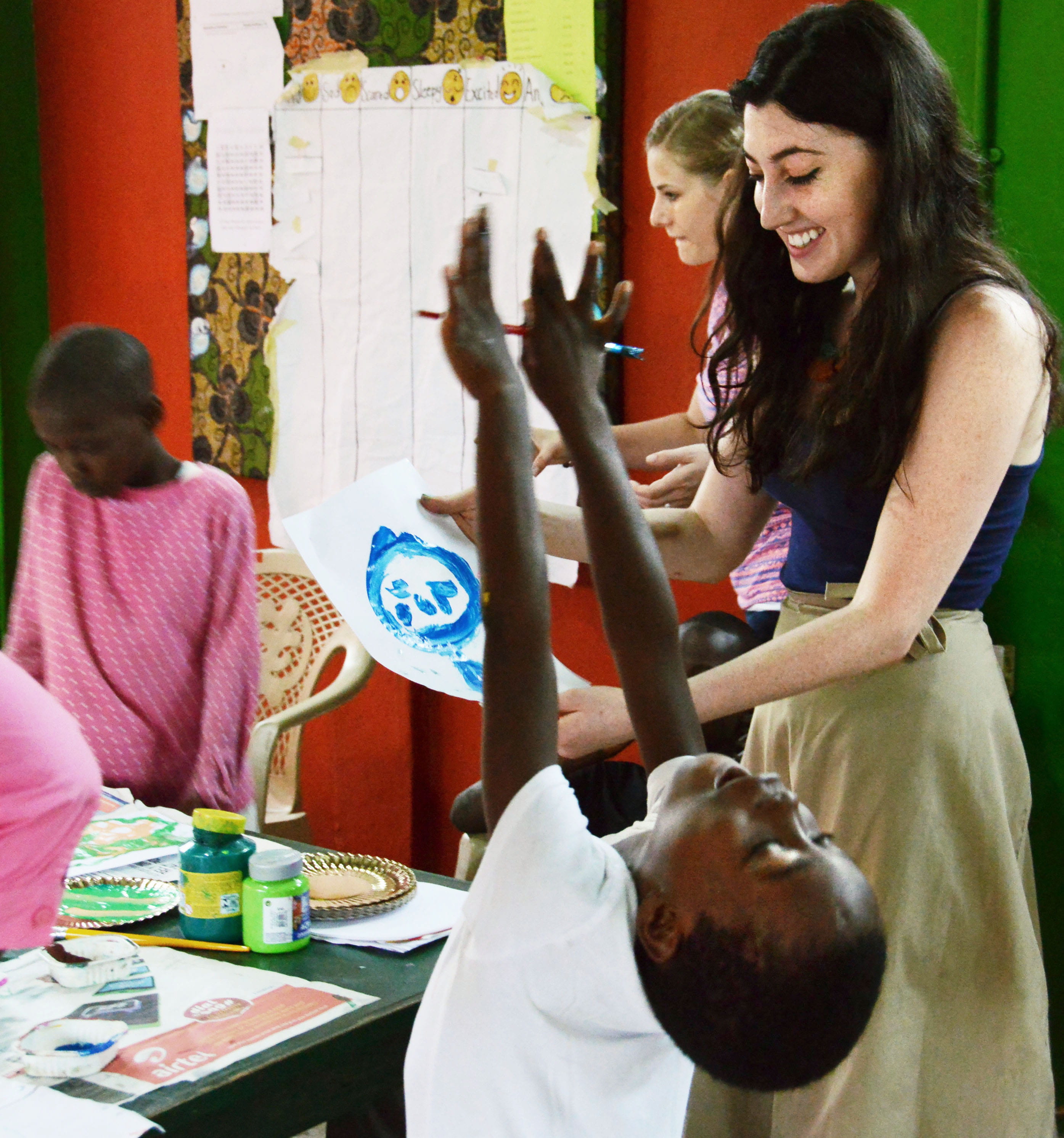
Stemming from her own experiences delivering art therapy workshops around the world, Ikuko Acosta, director of NYU Steinhardt’s Graduate Art Therapy program, and clinical associate professor, wanted to offer her students the invaluable experience of practicing art therapy internationally.
More than a decade ago, Acosta established a global internship program at Steinhardt to provide “the opportunity for students to develop racial and cultural self-awareness, work with diverse communities, hone critical thinking skills, and explore the role of art therapy in another culture.” Says alumna Krystal Atwood of her decision to enroll in the internship in Buenos Aires, “I wanted to learn everything I could to provide the most nuanced and culturally fluent art therapy services possible to a range of client populations.”
Coordinated in collaboration with several of NYU’s global sites, Acosta’s interns have practiced therapeutic arts in a wide array of foreign settings, including Florence, which welcomes its third cohort in July 2019. Some of this year’s group will serve a geriatric population that has worked with two different intern cohorts. Acosta recalled that this population was especially receptive to engagement in creative activities, noting “their facial expressions became cheerful, moods were boosted, and their social interactions improved.” In Accra, Ghana, students have worked at a rehabilitation center for young men with mental, cognitive and physical disabilities. A grouping, Acosta said, that contrasts with “facilities in the US where patients are usually separated based on the nature of their disabilities.” The men are also provided with “job training and various types of skills to survive in society” explained Acosta. During the three weeks that the men worked with interns, she emphasized that “they are not treated in a clinical sense, yet a very positive change can be seen in their self-esteem due to their increased ability to express themselves freely without being judged. Their general attitudes became more positive.”
Returning to NYU’s global sites offers faculty the opportunity to observe the long-term impacts of programs. In Ghana, when the van entered the driveway to the rehabilitation center one year later, Acosta and her students were greeted by shouts of “art therapy!” “And,” she added, “the young men went right back into making art as if they had done so yesterday.” When returning to the geriatric facility in Florence two years later, the demeanor of the residents immediately became “uplifted,” and they “even remembered the names of some interns from prior years,” providing “evidence,” that the “experiences were etched in their memories.” Acosta says that “while what we do may be little, at a basic human level, the experience leaves a bright and memorable spot in their minds.”
“There is an amazing resilience that each location reveals. The internship leads to a questioning of one’s values in a way that can’t be gained inside a classroom." Ikuko Acosta
Indeed, Acosta notes that “the program is not geared toward addressing mental illness directly” and that “it would be unrealistic to treat a patient in three weeks.” Furthermore, she explained that “applying a western concept of art therapy to non-western societies can create tension with local attitudes around mental illness. And therapeutic techniques that are not adapted to the culture situate the therapist as a colonialist.” But while mental illness is viewed in various ways around the world, she emphasized that “the symptoms and behavioral manifestations of mental and psychological disturbances are very similar. What differs are cultural attitudes and treatment.” Yet she has observed that art therapy brings together commonalities in international settings. “Art is universal and so too is human suffering.”
Regardless of location, Acosta says, art therapy students work to build a “human connection.” In every country in which the course has been held, Acosta has seen “students establish relationships despite not speaking the local language. They learn to become highly receptive and attuned to the subtleties of body language and other non-verbal cues.” She added that her students “thoroughly enjoy getting to know each client’s personality beyond his/her disability through creative communication.” Inevitably, explained Acosta, “basic human bonds are formed during experiences that are not bound by a singular form of expression. Connecting in this way is a universal phenomenon.”
Other skills that students quickly acquire, said Acosta, are “flexibility and adaptability, because their clinical training does not translate directly in foreign locations.” She went on to say that “outside of the US, concepts of boundaries between patient and client are much different, particularly those that are physical – it is common and natural for patients to openly and physically express affection to their therapists in many cultural contexts. Another example is corporal punishment, which seems to be an acceptable form of discipline in some countries.” Therapists in the US, Acosta explained, are trained to report signs of “abuse,” so it can be “difficult to set aside feelings of confusion about roles and responsibilities during the internship.”
Reflecting on her experiences in Buenos Aires, Atwood explained that she “felt humbled by the grace and dignity with which Dr. Acosta acknowledged our interpersonal struggles while maintaining hope for all of the involved parties and, ultimately, guiding the student interns toward providing life-changing art therapy services to the clients.” The level of care delivered by the interns is possible, says Acosta, because they “very quickly, learn to take a humanistic perspective and adapt to local mores.” “Interns observe, learn, and respect the host country and are not there to negate or impose their cultural norms,” she explained, and added that “after we leave, they resume their own lives, yet are instilled with memories of the brief but undeniable human connections that we all shared.”
Enlarge
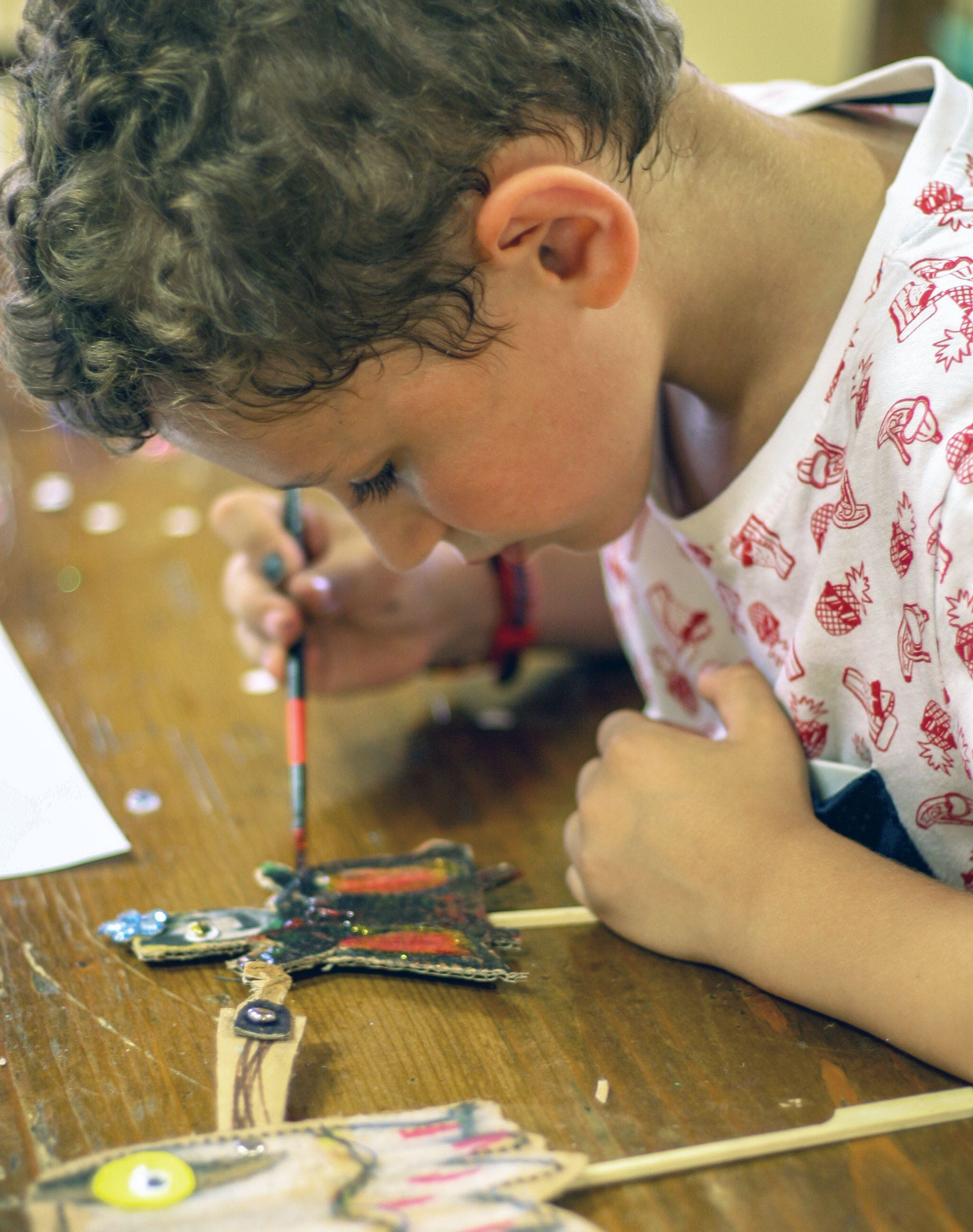
“Students also learn to adapt their planning process for clinical sessions,” said Acosta, as “they develop activities appropriate to the population […] and seek out locally available art materials.” During an early iteration of the program in India, coordinated by Cross-Cultural Solutions, a New York-based non-profit that provides volunteer service to communities around the world, Acosta said her students “found beautiful textiles with which they made dolls with women at a shelter for victims of domestic violence. They also collected many found objects from the streets, which they incorporated into a piece of artwork.” In Florence, a capital of the art world, “students find low cost materials at art stores and unusual items from junk shops.” Acosta elaborated that “these experiences too contribute to students’ creative growth and help them to become more flexible and less confined in their practice of art therapy.”
“Through exposure to how others survive amidst adversity,” Acosta noted, “with very limited resources and significant hardship, students gain a sense of humbleness.” For Atwood, her work with refugees and asylum seekers in Buenos Aires provided a glimpse into individuals’ experiences – many had fled war and violence, and struggled to live with uncertainty in the confines of refugee centers. During the internship, explained Krystal, she saw increases in “self-efficacy and a reduction of isolation as they connected with other refugees and asylum seekers in art therapy groups.”
“There is an amazing resilience that each location reveals,” said Acosta. “The internship leads to a questioning of one’s values in a way that can’t be gained inside a classroom. And that is essential as a therapist because personal value systems can’t be brought into clinical sessions.”
A Lab for Pedagogical Innovation: Doctoral Masterclasses at NYU Paris
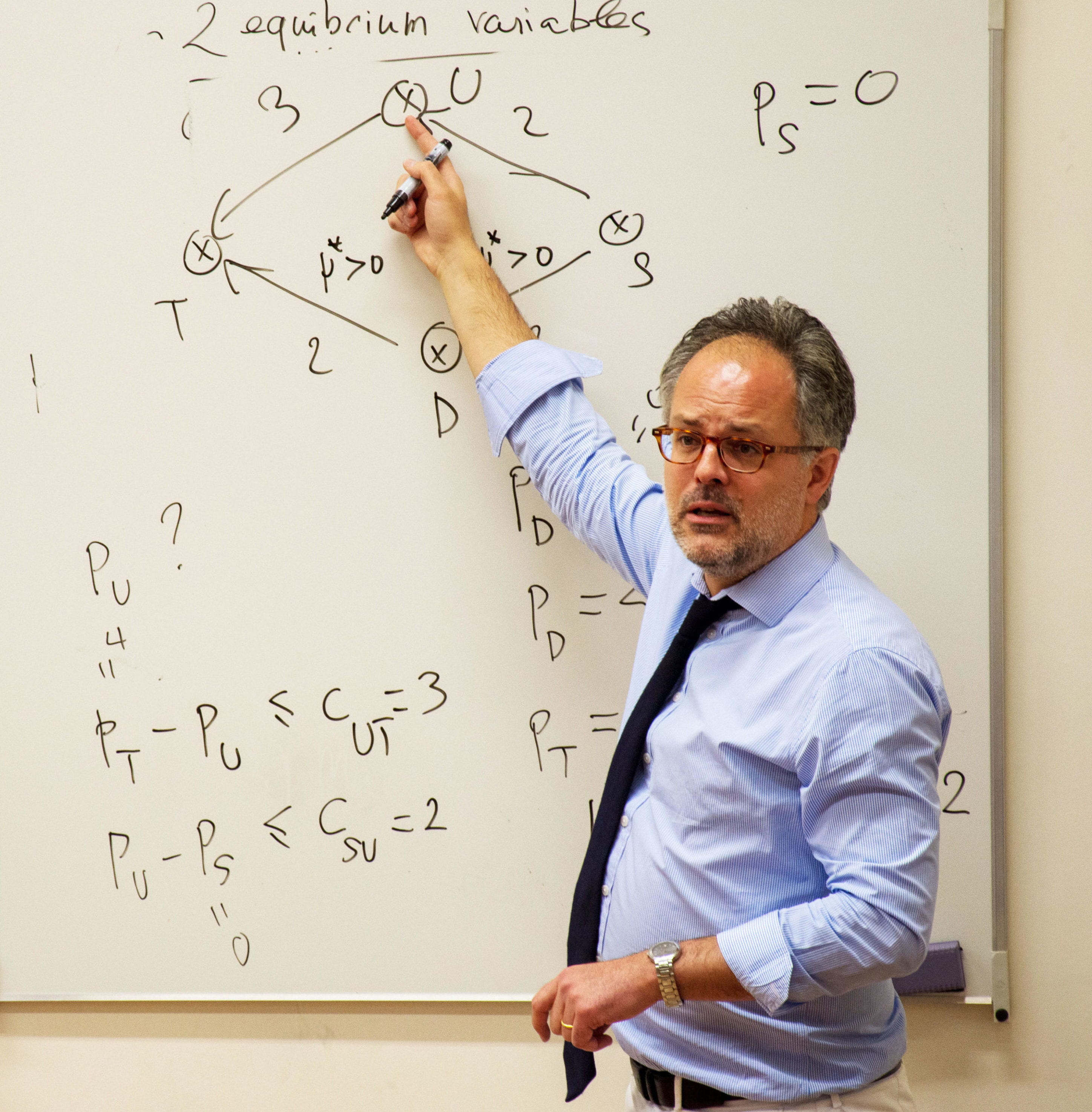
Paris hosted its first-ever master class, math+econ+code Masterclass on Optimal Transport, Choice and Matching Models, delivered by Alfred Galichon, NYU Paris site director, and professor, Department of Economics and Mathematics, Courant Institute, in late June.
Interdisciplinary in nature, the five-day course focused on “models of demand, matching models, and optimal transport methods, with various applications pertaining to labor markets, the economics of marriage, industrial organization, matching platforms, networks, and international trade from the crossed perspectives of theory, empirics and computation.”
Interestingly, it is Paris’ world renowned cooking schools, such as Le Cordon Bleu and L’Atelier des Chefs, that inspired Galichon to take a new approach to the delivery of coding lessons. Galichon says his approach was informed by “scientific-context-based learning principles, where theoretical tools are introduced just in time, as needed, at the point in time when they are called for by the specific application.” Under this model, much as culinary students would in a kitchen, Galichon’s students essentially take on the role of apprentices, and over time, move from their position at the periphery of a learning community to the center as they build their expertise.
Galichon explained that the course starts with a presentation of “the raw ingredients to the student, which in this case, means the data, such as the characteristics of consumers and of products.” Following this, he describes to the class “what we will cook, which in this case means the type of matching or pricing problems we will solve.” To make this delivery format possible, Galichon emphasized that “[t]he time-consuming data preparations” – the tasks of the sous chef – “have been done off-line. I show the ideas on the whiteboard, and then I cook/code them myself in front of the students,” explains Galichon. “The students then code themselves, inspired by what they saw.”
Galichon grounds his pedagogy in “a ‘learning-by-coding’ philosophy,” which involves creating code “in front of the students rather than showing them lines of pre-written code.” In this way, students actively learn in-situ, rather than via a scripted method that relies heavily on the passive visualization of code and other course content. Delivering immersive courses, he says, has allowed him to be “quite creative and test new pedagogical ideas that may apply to other courses of this type.”
The curriculum, said Galichon, was constructed to serve the needs of two core groups of doctoral candidates. “There is a big demand from students in economics who look to acquire coding skills, and who want to develop a deeper understanding of the mathematical structure behind the economic models,” he said, “and at the same time from students in math/computer students who seek to understand better the economic applications of their tools.” Crafted around these requirements, the “course provides students with the conceptual tools and coding skills in an apprenticeship philosophy.”
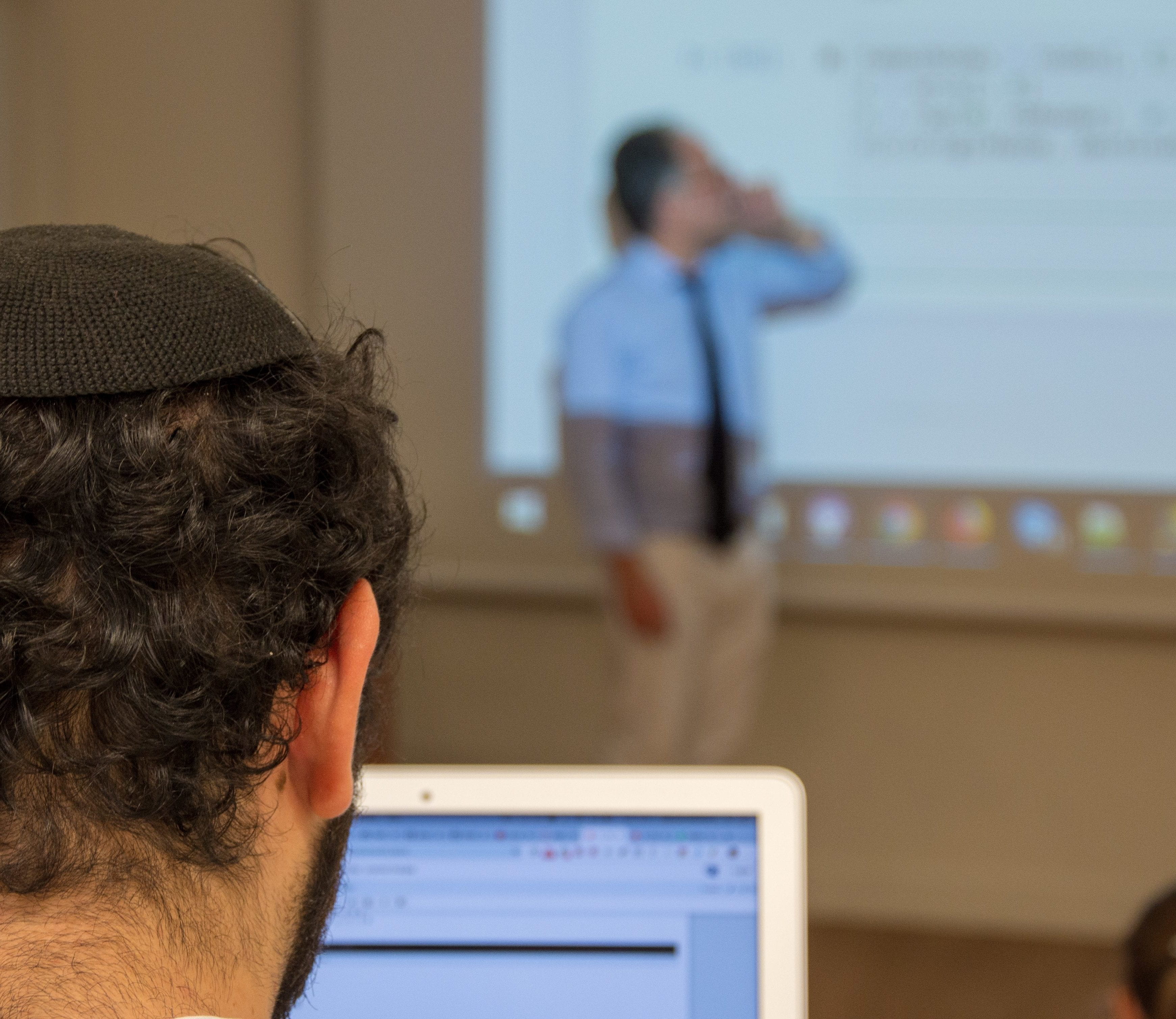
The masterclass quickly attracted “a wonderful mix of students,” said Galichon, from quantitative disciplines, including economics, math, computer science, and engineering. In addition to students from NYU, the inaugural cohort comprised international enrollees from Faculté des sciences de Tunis, and Harvard as well as others from “very strong [local] institutions” such as Sciences Po, and Ecole Polytechnique/Ensae.
The international nature of the masterclass is also part of the linguistic aspects of learning to code. The course presents several different types of coding languages simultaneously, lending to a sense of multiliteracy within the learning environment. This is accomplished, Galichon explained, with “the presence of ‘veteran students’ who, after the lectures, present the course material coded in other programming languages than the one I am presenting.” He added that “These are among the novel ideas that I will test in Paris, which will thus serve as a lab for pedagogical innovation.”
NYU Sydney Hosts MLK Scholars
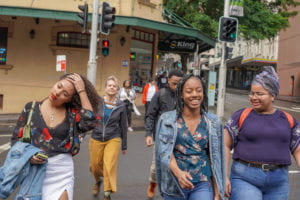 This March, NYU Sydney proudly hosted the Martin Luther King, Jr. Scholars Program Travel Colloquium.
This March, NYU Sydney proudly hosted the Martin Luther King, Jr. Scholars Program Travel Colloquium.
A group of 30 students from across all undergraduate divisions of NYU were accompanied by staff and faculty as they embarked on an intensive five days of education, discovery and service. This all-University scholars program was initially proposed by NYU’s Association of Black Faculty in 1986 with the first group of Martin Luther King, Jr. Scholars beginning their studies in 1987. The program brings together students with a demonstrated commitment to further the legacy of Dr. Martin Luther King, Jr. through excellence in academic achievement and distinguished leadership and community service.
The week officially began on Monday March 18 with a Welcome to Country performed by esteemed Aboriginal Elder and representative of the Metropolitan Local Aboriginal Land Council, Uncle Charles “Chikka” Madden. Madden welcomed the group to Gadigal land and discussed his own life and Aboriginal life and culture more broadly. The Welcome to Country was followed by a brief introduction and orientation from the NYU Sydney team before the scholars participated in their first academic lecture of the week.
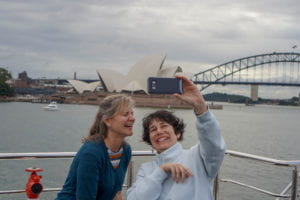 Facilitated by Dr. Laura McLauchlan, this class served to provide the platform of information by which learning throughout the week would be built upon. During this session the scholars explored the diversity of Aboriginal and Torres Strait Islander culture; the relationship between Australian settler culture and Aboriginal Australians; Australia’s experience of migration and multiculturalism; Australians’ relationship with their environment; and Australians’ sense of national identity. After lunch at Science House the group made their way to Customs House at Circular Quay on Sydney Harbour. At Customs House the scholars met with their walking tour guide and spent the next two hours walking around the city and learning about the economic and social forces that shaped modern Sydney. This tour included commentary from above a scale model of Sydney’s Central Business District and surrounding area.
Facilitated by Dr. Laura McLauchlan, this class served to provide the platform of information by which learning throughout the week would be built upon. During this session the scholars explored the diversity of Aboriginal and Torres Strait Islander culture; the relationship between Australian settler culture and Aboriginal Australians; Australia’s experience of migration and multiculturalism; Australians’ relationship with their environment; and Australians’ sense of national identity. After lunch at Science House the group made their way to Customs House at Circular Quay on Sydney Harbour. At Customs House the scholars met with their walking tour guide and spent the next two hours walking around the city and learning about the economic and social forces that shaped modern Sydney. This tour included commentary from above a scale model of Sydney’s Central Business District and surrounding area.
The second day began with a tour of the First Australians Gallery at the Australian Museum. This tour was facilitated by a Wiradjuri woman and it gave students a brief but comprehensive exposure to Aboriginal and Torres Strait Islander life, culture, customs and tradition. At Science House, Australian Historian and NYU Sydney instructor Justine Greenwood’s class examined immigration and multiculturalism in Australia. The day concluded with a visit to the National Centre for Indigenous Excellence. At NCIE the group learned about the history of the organization, some of their current challenges and the services they provide to the local Indigenous community. A highlight of this visit was the opportunity to meet with Wiradjuri woman and NCIE Aunty-in-Residence Glendra Stubbs.
Stubbs serves as a mentor for Indigenous young people from across Australia that are invited to stay at NCIE. Stubbs has worked with a number of state and national bodies including: as an Aboriginal Engagement Advisor for the Royal Commission into Institutional Responses to Child Sexual Abuse, the National Stolen Generations Alliance, and Metro Migrant Resource Centre. She is also a member of the advisory group of the NSW Government child protection and wellbeing program. Stubbs led the group to the NCIE child care center where she discussed her own lived experiences as an Indigenous person growing up in Australia as well as the experiences of members of Australia’s Stolen Generation.
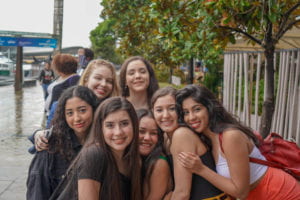 A special treat was arranged for the scholars on their third day in Sydney. On the way to the Blue Mountains a quick stop was made at the Featherdale Wildlife Park. At Featherdale, the students fed kangaroos breakfast and watched with amazement as koalas, dingos and wombats woke for the day. Following their trip to the wildlife park the group made their way to the World Heritage listed Blue Mountains to hike and learn about the region. The area is the traditional home of the Darug and Gundungarra peoples and for decades this location has been a “must see” for visitors to Sydney.
A special treat was arranged for the scholars on their third day in Sydney. On the way to the Blue Mountains a quick stop was made at the Featherdale Wildlife Park. At Featherdale, the students fed kangaroos breakfast and watched with amazement as koalas, dingos and wombats woke for the day. Following their trip to the wildlife park the group made their way to the World Heritage listed Blue Mountains to hike and learn about the region. The area is the traditional home of the Darug and Gundungarra peoples and for decades this location has been a “must see” for visitors to Sydney.
The Blue Mountains are home to 400 species of animals and some of Australia’s most breathtaking landscape. Charles Darwin crossed the Blue Mountains in 1836 and the students walked along the track that carries his name. At the conclusion of the hike the group met National Parks and Wildlife Service Aboriginal Discovery Ranger, Yamindirra Newton and learned about his experiences as sn Indigenous elder living in the region.
On day 4, Drs. McLauchlan and Greenwood co-facilitated a class that served as an opportunity for the group to reflect on their experiences thus far. The fifth and final day of the program was the day of service. The group travelled to Bradley’s Head on Sydney’s lower north shore to participate in a weeding project to protect the habitat of the red-crowned toadlet. The red- crowned toadlet is only found in the Sydney region and the group was charged with protecting its habitat by identifying and disposing of invasiveexotic weed species.
The MLK Jr Scholars Colloquium was a fantastic week in Sydney and the NYU Sydney team cannot wait to host future special programs.
Article by Marcus Neeld.
Images: MLK Scholar Kori Selwyn Vernon
Happy Summer
Congratulations Graduates!
In Conversation with NYU Shanghai Senior Yang Xiaohan
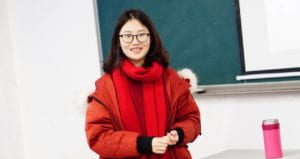 When she looks back on her time at NYU Shanghai, Yang Xiaohan ’19 says her four years here have been dominated by two themes: Her community service and efforts to expand opportunities for poor children in China, and her work toward a double major in Finance and Data Science.
When she looks back on her time at NYU Shanghai, Yang Xiaohan ’19 says her four years here have been dominated by two themes: Her community service and efforts to expand opportunities for poor children in China, and her work toward a double major in Finance and Data Science.
Yang is a native of Chengdu, in Sichuan Province. During her sophomore year, Yang co-founded the NGO FutureChina with some high school classmates to connect teenagers from economically disadvantaged families in southwest China with educational resources.
“We run a training camp where we invite 50-70 high school students from poor areas of Sichuan Province to workshops run by college students who have a proven record of academic excellence,” explains Yang. “We cover topics like business, computer science, and economics.”
As the group leader for students interested in business, Yang shows them how to create a business plan one step at a time, and encourages them to put their ideas to paper in a creative, yet methodical fashion. Most of the students end up writing business plans with ideas about how to give back to society and serve others, says Yang. “That really touched me. Many of them want to do something about the environment. They want to build companies in garbage sorting and reuse and they need some help developing the ideas and sorting out the impracticalities.”
Yang has been engaged in social impact activities at NYU Shanghai since her first year. At first, she joined the Stepping Stones Videolink initiative to give remote English lessons to fourth graders in Sichuan and Henan every week. Later, she joined the Deans Service Scholars, a university initiative to provide students opportunities to serve and study in disadvantaged communities in Shanghai and Asia, on a trip to Yunnan, planting trees and building a new habitat for the black snub-nosed monkey. While there, she noticed that most of the men and women in the area had left the region to find work, while only the old and young remained in the villages. The children had no parents to look after them, and had to walk for hours to school.
Realizing the inequalities in education resources in Henan and Yunnan spurred Yang’s efforts with FutureChina.
Jiang Ying, the group leader for the DSS trip to Yunnan, recalls meeting Yang for the first time during the interview for DSS. “She spoke very simply, but one thing she said left a deep impression on me,” remembers Jiang. “She said she’d heard about DSS at NYU Shanghai in high school, and that’s why she came here. She seemed anxious throughout the interview, but when she told me about this, there was a light in her eyes.”
Anna Kendrick, Clinical Assistant Professor & Director of Global Awards, taught Yang in a Global Perspectives on Society section during her first semester at NYU Shanghai. Kendrick has witnessed her growth over the past four years. “I admire her positivity and deep sense of justice,” says Kendrick. “[She has a] thoughtfulness about how she can best leverage her skills to create change.”
Yang says she also has ambitions beyond China – and wants to bring the voices of China’s poorest children to the world stage. During the winter of her junior year, Yang attended the Youth Assembly at the United Nations to talk to youth leaders from around the world about the unequal distribution of educational resources. After listening to her speech, an UN official said to her that he wished that the children themselves could come share their experiences.
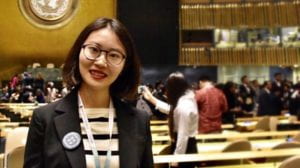
During the winter of her junior year, Yang Xiaohan attended the Youth Assembly at the United Nations.
That official’s comment inspired Yang’s latest venture. Future China now also selects high school students from its training camps, and sends them to the UN’s Youth Assemblies. “Since the summer of 2018, we’ve sent five students to the UN assembly. It really impacted them, seeing so many peers on such a huge platform, actively promoting global issues,” says Yang. “These UN trips have gradually helped them transition from people who need help, to people who want to help others. Yes, abilities and resources are still limited, but the seed of wanting to help others has been planted.”
Yang says her drive to help others developed very early in her life. When Yang was in primary school, one of her grandmothers lived in a part of Sichuan that was stricken by a severe earthquake. The volunteers who poured into the area to help left a lasting impression. “So many strangers helped them, selflessly. I also saw volunteers pitching in on disaster relief efforts,” remembers Yang. “That was when I decided I had to become like them.”
Though her interest in volunteering was set from the very beginning of her college career, Yang’s academic interests only became clear after a long process of soul-searching.
“When I started here, I wasn’t sure what I actually liked. I started taking finance classes because my family wanted me to try it,” Yang says. However, after interning at financial companies during the summers after her second and third years, Yang couldn’t see herself in the finance sector. In the meantime, Yang had discovered a new academic interest. After taking the IMA course, Interaction Lab, to meet the science requirement of the core curriculum, Yang discovered a passion for data and coding.
“Though it seems like I stumbled into data science, I think it was actually inevitable,” Yang says. “I was fascinated by the coding aspect. It was just so cool to realize an idea through code!”
While she was studying away in New York during her third year, Yang took the Introduction to Programming and Data Science course at NYU Stern. “It was a heavy course-load,” says Yang. “It was full-stack programming. We learned how to use web crawlers, construct databases, analyze data, and design websites.”
Yang says that the systematic nature of the course nurtured a love of data mining and analysis, and affirmed her decision to choose data science as a second major.
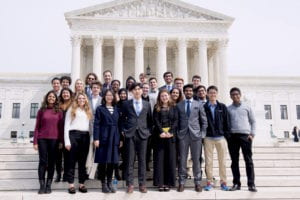
During study-away in New York, Yang Xiaohan also took the University Honors Leadership Course. In this class, the professor brought students to DC to visit the Supreme Court and interact with judges.
After returning to NYU Shanghai for her final year of university, Yang worked on a research project in her Machine Learning course under the direction of Enric Junqué de Fortuny, which uses linear regression, gradient descent, and neural networks. Yang and her team’s project involves concert pricing and venue selection, and is aimed at helping independent music groups set competitive ticket prices, and find the best venues.
Yang has learned to apply her data science know-how to other disciplines. She is assisting Assistant Professor Faculty Fellow of Engineering, Chen Zhibin in his work on transportation planning and new energy vehicles.
After graduation, Yang will return to Chengdu, and join a research project by the Institution of New Economic Development. “At this think tank, I will be doing research with Professor Zhou Tao, who is quite influential in China’s big data sector,” says Yang. “One of their ongoing projects is using information from CVs to analyze gender equality.”
Yang says her interest in this research topic is the real motivator behind her decision to return home. She recalls reading texts on topics of gender in her Global Perspectives on Society course during freshman year, and says this course introduced her to foundational feminist theories.
“Returning to Chengdu also means I’ll be on the ground for many of FutureChina’s efforts. We need people in Chengdu right now,” Yang says.
Kendrick says she is impressed with Yang’s determination to bring both the hard skills and ethical foundations she has built in school to her goals for social work. “She is not afraid to take risks and devote herself to her organization,” say Kendrick. “I wish her strength, courage and renewed dedication to her social efforts!”
Yang says she will miss the open and inclusive environment at NYU Shanghai. “This school is always encouraging everyone to think about who they really want to be. This gave me the courage to do what I’m truly interested in,” says Yang. “If I had gone somewhere else, perhaps I would still be adrift and unsure, afraid to make my own decisions.”
This post comes to us from NYU Shanghai. You can find the original here.
Mariet Westermann Named Vice Chancellor of NYU Abu Dhabi
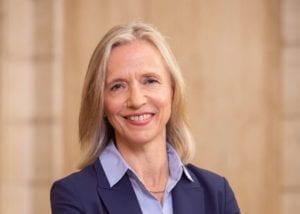 NYU President Andrew Hamilton today announced the appointment of Mariet Westermann — Executive Vice President of The Andrew W. Mellon Foundation, former provost of NYU Abu Dhabi, former director of NYU’s Institute of Fine Arts, and art historian — as the Vice Chancellor of NYU Abu Dhabi, effective August 1, 2019.
NYU President Andrew Hamilton today announced the appointment of Mariet Westermann — Executive Vice President of The Andrew W. Mellon Foundation, former provost of NYU Abu Dhabi, former director of NYU’s Institute of Fine Arts, and art historian — as the Vice Chancellor of NYU Abu Dhabi, effective August 1, 2019.
Her selection follows a 10-month long, international search that considered many outstanding candidates from around the world. According to President Hamilton, “We are thrilled by the appointment of Mariet Westermann. The creation of NYU Abu Dhabi was an innovative move, one that has helped make NYU pre-eminent in global education. And thanks to our shared vision with our partners, NYU Abu Dhabi has been a tremendous success: with distinguished faculty, top students from around the world from all backgrounds, and excellent leadership, it has become a regional leader in research, and its graduates have gone on to prestigious international honors, top graduate and professional programs, and leading employers and positions. Therefore, in choosing a new Vice Chancellor, we sought someone who would not only be a leader capable of taking NYU Abu Dhabi into its next stage, but who would also contribute to NYU’s leadership globally and be a real presence in the cultural and intellectual life of Abu Dhabi.”
“With her proven leadership qualities, her experience and involvement in the founding of NYUAD, her superb academic qualifications, her skill as an institution-builder, in Mariet Westermann we found just such a person,” said President Hamilton.
Dr. Westermann, the Vice Chancellor-designate of NYU Abu Dhabi, said, “It is a great honor and calling to serve as NYU Abu Dhabi’s Vice Chancellor. In a brief nine years, NYU Abu Dhabi has become a unique, flourishing institution of higher education: in and of New York University, in and of Abu Dhabi, in and of the world, with a truly diverse and engaged student community, an outstanding and dedicated faculty, an innovative undergraduate curriculum, and an ambitious research agenda. At a time when international engagement is vital to the future of our planet, NYU Abu Dhabi is a beacon situated in a dynamic city and a historic crossroads.”
In addition to being named to the Vice Chancellorship, she will be appointed a Professor of Arts and Humanities at NYU Abu Dhabi.
Westermann has been at the Mellon Foundation since 2010, and has been the executive vice president for programs and research since 2016. In that role, she has launched initiatives that study and promote the value of the humanities and the liberal arts, strengthen community colleges, encourage graduate education reform, renew preservation of cultural heritage around the world, and support scholars and artists at risk. At Mellon, she has also led pathbreaking work on diversity and inclusion in American museums, and written extensively about the liberal arts, the humanities, and higher education. Prior to the foundation, she was on the faculty at NYU, first as director of the Institute of Fine Arts and then as the first provost of NYU Abu Dhabi, where she hired the startup team and initial faculty, helped shape the curriculum and launch the NYU Abu Dhabi Institute, and developed warm relationships with the Abu Dhabi community, among other important undertakings. Before coming to NYU in 2002, she was associate director of the Clark Art Institute. From 1995 to 2001, she was an assistant and associate professor of art history at Rutgers.
She received her undergraduate degree, magna cum laude, from Williams College, where she was elected to Phi Beta Kappa. She received her Masters and her PhD from NYU’s Institute of Fine Arts.
Westermann’s principal area of scholarly interest is the art of the Netherlands, her native country. She is widely published in the field, including A Worldly Art: The Dutch Republic 1585–1718 (1996); The Amusements of Jan Steen: Comic Painting in the 17th Century (1997); Rembrandt – Art and Ideas (2000); and numerous articles. She has edited five books, including Anthropologies of Art (2005). Her extensive work with museums includes her Rijksmuseum Dossier: Johannes Vermeer (2004); the curatorship of Art and Home: Dutch Interiors in the Age of Rembrandt (Denver Art Museum and Newark Museum, 2001); and numerous exhibition catalog essays. She is currently preparing an exhibition and book on the resonance of the Garden of Eden in the history, theology, and art of Judaism, Christianity, and Islam, with significant implications for garden practice in these cultures. She has been the recipient of fellowships, honors, and grants from a wide range of organizations, including the National Endowment for the Humanities, American Philosophical Society, Center for Advanced Study in the Visual Arts, Clark Art Institute, College Art Association, and Metropolitan Museum of Art.
President Hamilton said, “Along with the announcement of this good news about Mariet, two expressions of gratitude in order. First, I am grateful to Dick Foley and Una Chaudhuri, the co-chairs of the Search Committee, and all the other members of the Committee. Their thoughtfulness, discernment, and perseverance have resulted in a wonderful person to lead NYU Abu Dhabi during the next stage of its development. The Committee members took on this important task in addition to their existing responsibilities, and I thank them.
“I would also like to take this occasion to extend NYU’s profound gratitude to Al Bloom, NYU Abu Dhabi’s inaugural vice chancellor. Turning a groundbreaking idea into a reality is one of the most exciting things one can do in one’s career, and one of the most difficult, perhaps particularly so in the field of higher education, where reputation matters so greatly and usually requires such a long time to build. Al made sure that NYU Abu Dhabi succeeded on every measure. Over time, the establishment of NYU Abu Dhabi will, without doubt, turn out to be one of the great success stories of higher education. Al should be very proud of what he’s accomplished; we are surely proud of him.”
NYU Abu Dhabi represents a transformative shift in higher education, one in which the intellectual and creative endeavors of academia are shaped and examined through an international and multicultural perspective. Admissions selectivity and yield among students from over 120 countries equals or exceeds that of the most rigorous global institutions. And in under ten years, NYU Abu Dhabi has produced 12 Rhodes Scholars — the highest number of Rhodes Scholars per student of any university in the world – in addition to five Schwarzman Scholars and numerous other prestigious academic awards, including Truman and Luce Scholarships and Fulbright Awards.
This post comes to us from NYU Abu Dhabi. You can find the original here.
NYU Paris Liberal Studies Freshman Students Win Prize at NYU Policy Case Competition
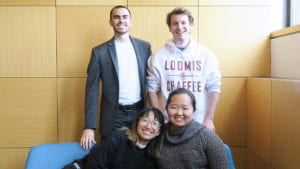 NYU Paris Liberal Studies freshman or First Year Away students Spencer Julian, Jarrett Lash, Wendy Li, and Cecilia Wang competed in the sixth annual New York University Policy Case Competition this weekend, where the team won the international policy category and competed in the Final Five round.
NYU Paris Liberal Studies freshman or First Year Away students Spencer Julian, Jarrett Lash, Wendy Li, and Cecilia Wang competed in the sixth annual New York University Policy Case Competition this weekend, where the team won the international policy category and competed in the Final Five round.
The Policy Case Competition is a conference hosted by the NYU Politics Society, in which students of all experience levels are given the opportunity to propose policy solutions in response to critical current issues. This year’s first round competition had over 550 participants from universities around the world, with the competition divided into five topics: International, Domestic, New York City, Technology, and South Africa.
Julian, Lash, Li, and Wang submitted a policy memo on maritime policy, with recommendations to the Executive Office of the United States to strengthen its capabilities in the arctic region by increasing military soft power and facilitating the creation of an intergovernmental forum on arctic trade and economics.
This post comes to us thanks to NYU Paris and Liberal Studies and you can learn more here.
